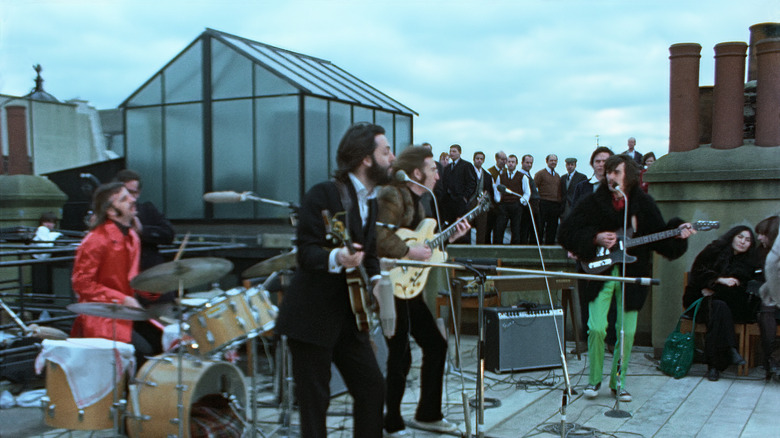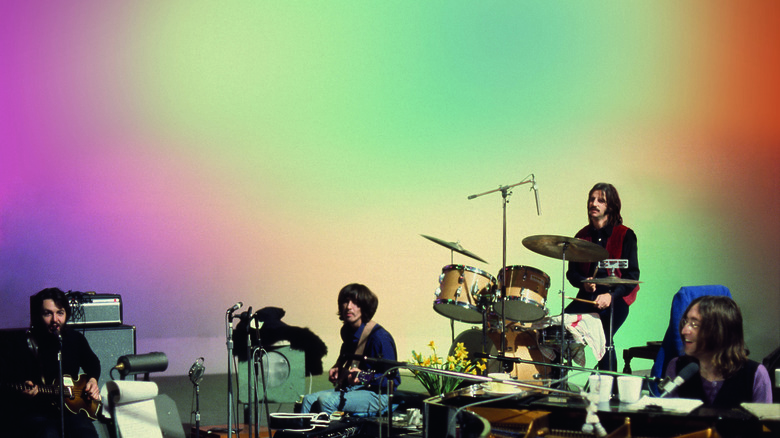
The new 8-hour, 3-part docuseries "The Beatles: Get Back," branded as a Disney+ Original and hailing from blockbuster filmmaker Peter Jackson, raises two unavoidable and unfortunately unanswerable questions. First, why is this 8 hours long? And second, why is this on Disney+? The latter question, no less a head-scratcher than the first, at least does not pose as a commentary on the content of "The Beatles: Get Back." But for a streaming service that is awfully shy about presenting some of its own kid-friendly animated content from the 1930s and 1940s for fear of being tarnished as too problematic, it's impressive that Disney+ is also willing to air uncut a documentary where musicians let the f-word fly calmly.
The larger problem looming over "The Beatles: Get Back" is why this mammoth project needs to be quite so mammoth. Jackson, as many people both on social media and in the real world will remind you, is no stranger to struggling to end his projects, or don't you remember the countless endings of "The Lord of the Rings" trilogy? (Or, perhaps more fitting to this film, the fact that he turned one novel, "The Hobbit," into three extremely long films.) It's truly remarkable that Peter Jackson's last two major projects are both documentaries -- before this, he directed the World War I documentary "They Shall Not Grow Old," and somehow, the documentary about World War I wasn't the eight-hour project.
Using the raw footage compiled by filmmaker Michael Lindsay-Hogg during the creation and recording of "Let It Be," the 1970 album that marked the dissolution of The Beatles, Jackson has brought together a shaggy, formless, aimless, and thus, endless documentary that rarely ever feels quite as momentous from the year 2021 as it should. Lindsay-Hogg used the footage for his own film, also titled "Let It Be," but that 80-minute documentary, half of which includes the final public performance of the Beatles, in an iconic concert on the roof of their London recording studio, has long been considered a weak link in the Beatles' filmography. "The Beatles: Get Back" features the imprimatur of living Beatles Paul McCartney and Ringo Starr (both of whom serve as producers), as well as Yoko Ono Lennon and Olivia Harrison, the widow of the late George Harrison. The finished project, which was released in three separate parts over the Thanksgiving weekend, covers the month of January 1969, from when the Beatles return to a recording studio in Twickenham, England, only to revive some internal tensions, before they move to Apple Studios and record what ends up as their last record.
A Lack Of Focus And Editing

Before the final 40 minutes of this unnecessary saga, "The Beatles: Get Back" has glimmers of life throughout. There are moments in which the irrepressible musicianship of McCartney, Starr, John Lennon, and Harrison is both apparent and delightful to behold. When they're playing music, even in a low period near the end of the quartet's partnership, the Beatles are just so much damn fun to watch. Each of us has our own personal favorites among their many songs, but when you see the group slowly circle around the correct hooks for "Get Back" and the haunting "Let It Be," the arrival at those solutions is thrilling. And there are a few moments where the back-and-forth banter or clowning around is enjoyable to watch. But more often than not, watching these icons tooling around in the recording studio is akin to watching someone else play a video game while also pausing the action every few minutes to debate what snack to eat next.
The bracing lack of editing -- yes, it's true that Lindsay-Hogg had upwards of 150 hours of footage, but there are moments in "The Beatles: Get Back" where the finished product feels that long -- is all the more noticeable when the three-part documentary arrives at the climax anyone with even a passing hint of awareness of the Beatles and their history is familiar with: the rooftop concert that served as the last time the Beatles played in public. The 40-minute section of the film is the finale, and it is the undeniable if obvious high point. It doesn't matter that you're watching the Beatles play a couple songs more than once -- "Get Back" is performed in some form three times during this segment. The raw talent and energy is electric, reflected in man-on-the-street interviews filmed at the same time as the performances, showing that people young and old could rally around this music. Jackson, here, employs a number of split-screen effects to highlight how multiple cameras at different angles captured the performance. It's not just the songs that work but the way it's all presented, thus making the surrounding 7.5 hours galling and perplexing.
If the conventional wisdom among Beatle fans is correct, and Lindsay-Hogg's "Let It Be" film is a disappointment, then there has to be a middle ground between that and Peter Jackson's "The Beatles: Get Back." Jackson has already hinted at the possibility of a further director's cut, because an 8-hour version apparently just didn't bring everything into the fold. (That much, actually, isn't terribly shocking: though the documentary purports to cover 22 days of the Beatles' recording, the last day's footage is cobbled together in the end credits, in spite of featuring the take of "Let It Be" that's on the album released in 1970. Seems like something worth including outside of the end credits!) There's a good chunk of fascinating footage here amidst the duller and flatter sections, or parts of sections. But "The Beatles: Get Back" only truly comes to life when the eponymous band performs, and it happens far less than you might want over the course of 8 hours.
/Film Rating: 4 out of 10
Read this next: The 11 Best Music Documentaries Of All Time
The post The Beatles: Get Back Review: A Shapeless Documentary With A Fantastic Ending appeared first on /Film.
from /Film https://ift.tt/3xx04fW
via IFTTT
Comments
Post a Comment